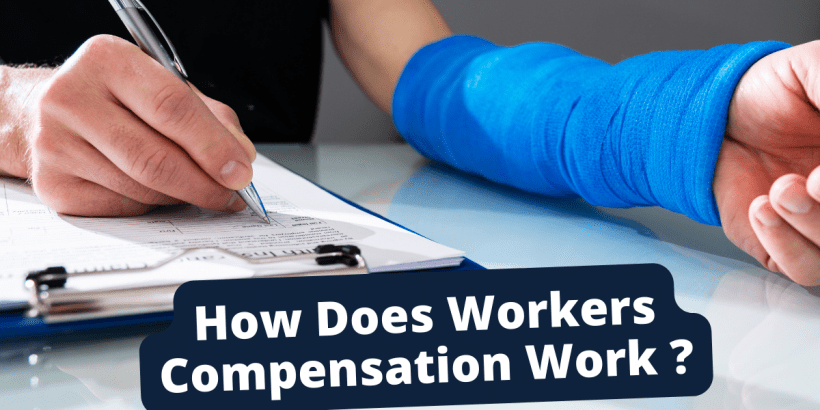How Does Workers Compensation Work ?
Workers’ compensation insurance provides vital benefits to employees who are injured or sick on the job.
Workers’ compensation benefits can include medical treatment and ongoing care, wage replacement payments, and even death benefits.
Most states require businesses to purchase workers compensation insurance for their employees, even if they only have one.
What Exactly Is Workers’ Compensation?
Workers’ compensation pays for lost wages and medical expenses for employees who are injured on the job.
Employers pay for workers’ compensation insurance.Employees make no contributions to the fund.
If the employer or insurance company confirms that the injury or illness was caused by work, workers compensation is paid.If the insurer or employer denies the workers’ compensation claim, a workers’ compensation judge makes a decision.
Workers compensation may compensate a family after a work-related death, in addition to paying for injuries and rehabilitation.
Workers Compensation Basics
- Beginning in 1911, workers’ compensation programs were established by state statute or within state constitutions.
- Each of the 50 states, as well as the District of Columbia, now has its own workers compensation program.
- Workers compensation insurance is required in all states, with the exception of Texas and Wyoming.
- Agricultural workers, domestic workers, and independent contractors are generally exempt from the requirement for workers compensation insurance.
- According to a study published in November 2020 by the National Academy of Social Insurance, total workers’ compensation benefits paid in 2018 were $62.9 billion.
What Does Workers’ Compensation Insurance Include?
Let’s take a closer look at the workers’ compensation benefits.
- Workers compensation covers all medical expenses, including hospital visits, medications, and emergency surgeries.
- When an employee requires time away from work to recover from a work-related illness or injury, lost wages are partially reimbursed.
- If the injury resulted in a partial or permanent disability, disability benefits are available.
- Workers compensation covers ongoing care costs such as physical therapy.
- Funeral expenses and survivor benefits for the worker’s family are common components of death benefits.
Workers compensation benefits are paid regardless of who is at fault.Employees are typically barred from suing their employers for a work-related injury or illness under workers’ compensation laws.
How Does Workers Compensation Work and Is Covid-19 covered by workers’ compensation?
If you were exposed to Covid-19 at work, you may be eligible for workers compensation depending on your state and occupation.The National Conference of State Legislatures states:
- Seventeen states and Puerto Rico have taken action to include Covid-19 as a work-related illness in workers compensation coverage.
- Several states have passed legislation requiring Covid-19 workers’ compensation coverage for certain types of employees.First responders and health care workers are exempt from coverage in Minnesota, Utah, and Wisconsin.All essential workers are covered in Illinois, New Jersey, and Vermont.All workers are covered in California and Wyoming.
- California and Kentucky have taken executive action to provide coverage to other critical workers, such as grocery store workers.
How Does Workers Compensation Work and What Is Excluded In Workers’ Compensation Insurance?
Employees are entitled to workers compensation regardless of how many hours they work.
However, there are some exclusions that could result in a denied workers’ compensation claim, such as:
- Traveling to and from work is typically excluded from workers compensation coverage.
If a person is in a company vehicle or does not have a physical office, such as a traveling salesperson, they may be covered. - Intoxication or substance abuse: Many states deny workers’ compensation coverage if the injured person was intoxicated at the time of the accident and this contributed to the injury.
- Workplace fight: If you are injured while fighting with a coworker, workers compensation may not cover your injuries.The only exception is if the fight was over work.
How Does Workers Compensation Work and Where Can I Get Workers Compensation Insurance?
Do you need to purchase workers’ compensation insurance for your employees?
Depending on your state, you may purchase workers’ compensation from private insurance companies or from a state-run agency—or you may have both options.
Private workers compensation insurance companies set their own rates and decide whether or not to accept or reject customers.A private insurer may offer a lower rate than a state fund.
If you are unable to obtain the workers compensation coverage you require from a private insurer, you may wish to consider a state-funded program.
Private insurers and state-funded programs compete for customers in a competitive, state-funded workers compensation program.
Businesses in monolithic, state-funded workers compensation programs have no choice but to obtain workers compensation coverage from a state-funded program.Ohio, North Dakota, Washington, and Wyoming are examples of states with centralized state-funded workers’ compensation programs.
How Does Workers Compensation Work and How Much Does Workers Compensation Insurance Cost?
Workers’ compensation premiums are based on employees’ job classifications, which reflect the riskiness of the job.Construction workers and electricians, for example, are high-risk occupations.
Police officers, firefighters, lumberjacks, and telecommunications repair workers are among the other high-risk occupations.
Workers compensation premiums are also affected by the company’s payroll and any previous workers compensation claims.
According to The Hartford, workers’ compensation insurance costs an average of $1 for every $100 in payroll.
This average varies greatly by state.
“If there is confusion about workers comp, it usually revolves around how the premium is determined in part by the number of employees on the payroll,” says Andrew Dalton, assistant vice president for The Hartford’s small commercial workers compensation line of business.
“State law typically requires every workers’ compensation insurance company to perform an audit of the premium paid once a year.”
“It’s important to remember that this audit is required, and that the business owner is accounting for their employees throughout the year,” Dalton says.
The audit examines the company’s payroll for the previous year to determine whether premiums were collected too much, too little, or just right.It also determines the premium for the following year.This audit may result in the business owner receiving a refund or credit, or in owing more on their workers’ compensation premium.
How Does Workers Compensation Work ? and How to File a Workers Compensation Claim
The first step in filing a workers’ compensation claim is for the employee to notify their employer of their work-related illness or injury.
The employer should then notify the insurance provider and, if necessary, the state workers compensation board.
Furthermore, the employer must report severe workers’ compensation injuries to the Occupational Safety and Health Administration.
Workers’ compensation claims can be contested if an employer believes the injury or illness was not caused by work.
Furthermore, the employee may be required to appear before a workers compensation board to present their case for compensation.
How Does Workers Compensation Work ? and Risk Management in Workers Compensation Claims
You can keep future premiums under control by working to reduce your company’s risk of workers’ compensation claims.
“There’s a lot that can help a business owner control their risk of employee injuries,” Dalton says.
“You don’t want to leave these things to chance, and you want to make sure you have safety protocols and procedures in place, as well as that your company has taken steps to reduce the types of things that can cause injury.”
Employee training on workplace safety is an important step toward reducing worker injuries and accidents.
Many states provide discounts on workers’ compensation insurance if the company implements a workplace safety program.This safety program could include the following elements:
- Written safety policies and procedures
- Inspections for safety
- Maintenance that is proactive
- First aid
- safety training
Get Professional Assistance
“Speaking with a licensed, independent agent is the best way to ensure you have the right insurance for your business, including workers comp,” says Dalton of The Hartford.
“They work every day to figure out what’s best for every type of business out there.”
Business owners have a lot on their plates, and one of the things they need to consult an expert on is insurance.”

